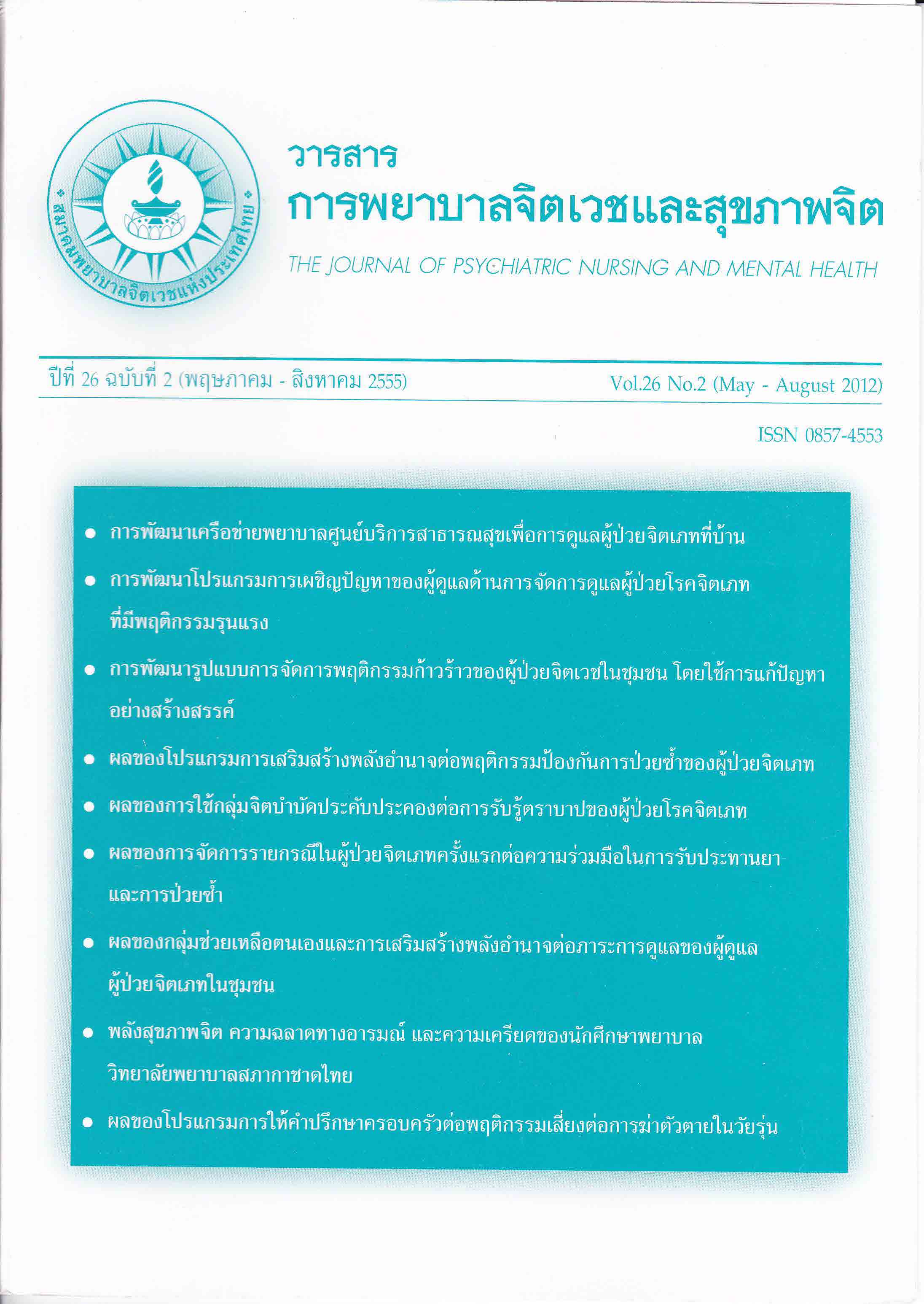พลังสุขภาพจิต ความฉลาดทางอารมณ์ และความเครียดของนักศึกษาพยาบาล วิทยาลัยพยาบาลสภากาชาดไทย
Main Article Content
บทคัดย่อ
บทคัดย่อ
การศึกษาครั้งนี้มีวัตถุประสงค์เพื่อศึกษาพลังสุขภาพจิต ความฉลาดทางอารมณ์ ความเครียดและความสัมพันธ์ระหว่างพลังสุขภาพจิต ความฉลาดทางอารมณ์ กับความเครียดของนักศึกษาพยาบาล ประชากรเป็นนักศึกษาพยาบาลชั้นปีที่ 2ปีที่ 3 และปีที่ 4 วิทยาลัยพยาบาลสภากาชาดไทยจำนวน 516 คน เครื่องมือที่ใช้ในการวิจัยประกอบด้วย แบบสอบถามข้อมูลทั่วไป ความพึงพอใจในวิชาชีพการพยาบาลเมื่อเข้าเรียนและ ณ ปัจจุบันแบบประเมินพลังสุขภาพจิต แบบประเมินความฉลาดทางอารมณ์ แบบทดสอบความเครียดสวนปรุง ของกรมสุขภาพจิต กระทรวงสาธารณสุขวิเคราะห์ข้อมูลโดยใช้สถิติพรรณนาและหาความสัมพันธ์ระหว่างพลังสุขภาพจิต ความฉลาดทางอารมณ์ และความเครียด ด้วยสหสัมพันธ์แบบเพียร์สัน ผลการศึกษาพบว่า นักศึกษาพยาบาลทุกชั้นปีมากกว่าร้อยละ 80 มีความพึงพอใจในวิชาชีพพยาบาลเมื่อเข้าเรียนและ ณ ปัจจุบันคะแนนเฉลี่ยโดยรวมพลังสุขภาพจิต ชั้นปีที่ 2ปีที่ 3 และ ปีที่ 4 เท่ากับ 60.90, 62.56, 63.67ตามลำดับ ระดับความฉลาดทางอารมณ์โดยภาพรวมของนักศึกษาทั้ง 3 ชั้นปี อยู่ในเกณฑ์ปกตินักศึกษาพยาบาล ชั้นปีที่ 3 มีความเครียดระดับสูงมากที่สุด ร้อยละ 45.5 พลังสุขภาพจิต มีความสัมพันธ์ทางลบกับความเครียดของนักศึกษาพยาบาลชั้นปีที่ 2 ปีที่ 3 และปีที่ 4 อย่างมีนัยสำคัญทางสถิติ (r = -.316 , -.198 และ -.337 ตามลำดับ,p = .01) และความฉลาดทางอารมณ์มีความสัมพันธ์ทางลบกับความเครียดของนักศึกษาพยาบาล อย่างมีนัยสำคัญทางสถิติ (p = .01)
คำสำคัญ : พลังสุขภาพจิต, ความฉลาดทางอารมณ์, ความเครียด, นักศึกษาพยาบาล
Abstract
The purpose of this research was to study Resilience Quotient, Emotional Quotient, stress and the correlation between Resilience Quotient, Emotional Quotient and stress in nursing students. The population were 516 second–fourth year students at Thai Red Cross College of Nursing. The data were collected by using questionnaire; which consists of demographic data and general information, satisfaction of nursing professional at first time and at present, Thai Resilience Quotient screening test, Emotional Quotient screening test and Suanprung Stress Test from Department of Mental Health, Ministry of Public health. The data were analyzed and presented in term of descriptive statistics and Pearson Product Moment Correlation Coefficient. The results showed that more than 80 percent of nursing students were satisfied in nursing professional at first time and at present. Average scores of Resilience Quotient of 2nd, 3rd, 4th year nursing students were 60.90, 62.56 and 63.67. The level of Emotional Quotient was normal. The results of level of stress showed that 45.5 percent of 3rd year nursing students had high. The correlation between Resilience Quotient and stress in 2nd, 3rd, 4th year nursing students showed that the score of Resilience Quotient was inversely related to scores of stress (r = -.316, -.198, - .337) with statistical significant (p = .01). Also, the correlation between Emotional Quotient and stress in 2nd, 3rd, 4th year nursing students showed that the score of Emotional Quotient was inversely related to scores of stress with statistical significant (p = .01).
Keywords : R.Q. (Resilience Quotient), E.Q.(Emotional Quotient), Stress, Nursing Students
Article Details
บทความที่ได้รับการตีพิมพ์แล้ว เป็นลิขสิทธิ์ของสมาคมพยาบาลจิตเวชแห่งประเทศไทย


